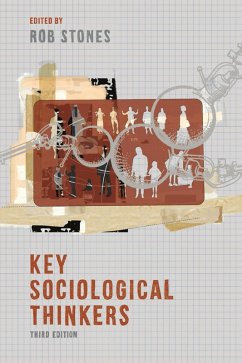The third edition of this popular and established core textbook provides an invaluable guide to 24 of the most influential thinkers in Sociology. Written by leading academics in the field, Key Sociological Thinkers provides a clear and contextualised introduction to classical and contemporary theory. Each chapter offers an insightful assessment of a different theorist, exploring their lives, works and legacies, and in a much-valued 'Seeing Things Differently' section authors demonstrate how each thinker's ideas can be used to illuminate aspects of social life in new ways.
With frameworks for deep learning around group discussion, this continues be an essential text for undergraduate and postgraduate modules on sociological and social theory.
New to this Edition:
- Four new chapters, on Mead, Du Bois, Latour and Alexander
- Five chapters by new authors on existing key thinkers: Durkheim, Merton, Goffman, Bourdieu, and Giddens
- A major new introduction
- An updated, structured and annotated 'Further Reading' section for each thinker
- Extended accounts of 13 additional thinkers who have influenced, or been influenced by, the key thinkers
With frameworks for deep learning around group discussion, this continues be an essential text for undergraduate and postgraduate modules on sociological and social theory.
New to this Edition:
- Four new chapters, on Mead, Du Bois, Latour and Alexander
- Five chapters by new authors on existing key thinkers: Durkheim, Merton, Goffman, Bourdieu, and Giddens
- A major new introduction
- An updated, structured and annotated 'Further Reading' section for each thinker
- Extended accounts of 13 additional thinkers who have influenced, or been influenced by, the key thinkers


